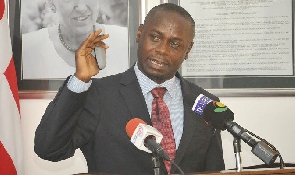 Prof. Eric Osei-Assibey is an economist
Prof. Eric Osei-Assibey is an economist
A Senior Lecturer at the Department of Economics of the University of Ghana, Prof. Eric Osei-Assibey, has stated that the current rate at which Ghana is being downgraded may continue until the country secures an IMF deal.
The economist noted that even though these downgrades send negative signals to investors, the economy will rebound with time.
“This is not good but once you have this negative information coming up every now and then affecting your currency and others, we should expect more of this until the government reaches an agreement with the IMF and external debts holders,” he is quoted by myjoyonline.com.
“These things will come but I’m sure with time the economy will be stable with the IMF programme. Government as I said earlier should support various sectors of the economy,” he added.
Background
International ratings agency, Fitch, has once again downgraded Ghana’s long-term foreign-currency issuer default rating to 'restricted default'.
The development comes after the government missed the grace period to make a $40.6 million coupon payment on its $1 billion 2026 Eurobond.
Due to the current economic challenges in the country, Ghana has suspended making payments on selected external debt components.
The latest verdict by Fitch comes after Ghana's local debt rating was downgraded to ‘restricted default' on February 14, 2023.
Fitch in a recent statement issued on February 21, 2023, downgraded Ghana's Long-Term Foreign-Currency (LTFC) Issuer Default Rating (IDR) to 'RD' (Restricted Default) from 'C'.
It further added that it does not assign outlooks to sovereigns with a rating of 'CCC+' or below.
Fitch also downgraded the rating of Ghana’s US$1 billion Eurobond maturing on 18 January 2026 to 'D' from 'C' and withdrew its rating.
“Fitch has affirmed all the long-term senior unsecured foreign-currency-denominated issue ratings at 'C' and withdrawn their ratings. Fitch has also affirmed the partially-guaranteed USD1 billion notes maturing in 2030 at 'CC',” the agency said.
SSD/FNOQ